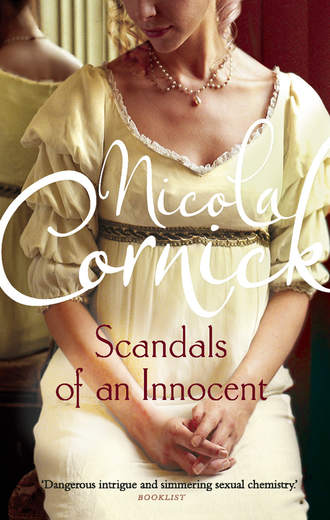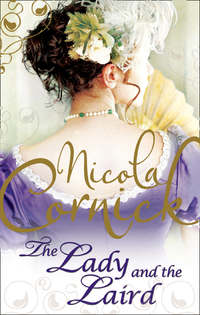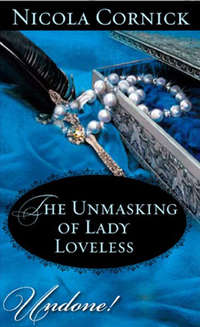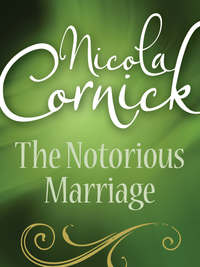
Полная версия
Scandals of an Innocent
Except that holding Alice in his arms tonight had reminded him of just how much he had wanted her. There was something about her that aroused some very basic instincts in him, instincts other than greed for her money, of course. Tonight she had smelled heavenly, of roses and honey, rather than the heavy, manufactured perfumes preferred by the courtesans he had known. The scent had clung to her hair, which, once he had dispensed with her hat, had glowed a glorious pale silver color in the moonlight. Alice was small in terms of height, but she was rounded rather than slender, and her body had been curved, soft and yielding against the hardness of his. Some people might consider Alice plump—in fact some society matrons, looking for things to disparage about the housemaid-turned-heiress, had criticized Alice’s robust peasant build and commented on how useful such sturdiness must have been when she was turning mattresses and beating carpets. Miles had no criticisms to make at all when it came to Alice’s figure. She might not be conventionally beautiful but she was strikingly pretty with the promise of something sensual within. The fact that her sensuality was deliciously unawakened only made her more of a temptation to him. He had a primitive urge to be the one to waken all that promise.
He shifted in his chair as he remembered the gentle curves of Alice’s body molding themselves so confidingly to his. He had been instantly aroused, trapped by a sensuality so hot and fierce he had wanted to strip those boy’s clothes off her there and then, and take her against the wall.
His ribs gave a painful twinge, dampening his ardor most effectively. In order to get away from him, the little minx had pulled a trick that would not have disgraced a pickpocket from the stews of London. He supposed that as a servant, Alice would need to know such ruses to defend her virtue. He would do well to remember that in future before he was felled with a painful knee in the groin.
“I was merely taking the air,” he said, to looks of patent disbelief from his friends. “Too much claret.”
“You were so long we thought you had been taking the maidservant at the Morris Crown, never mind the air,” Dexter observed.
“And what is that?” Nat followed up on Dexter’s comment, pointing at the rather grubby wedding gown in Miles’s hands. “Miles, old fellow, I think the inheritance of another fifty thousand of debt along with the Drum title is turning your mind.”
“I found it in the street,” Miles said, looking at the dress and deliberately neglecting to add that he had found one of the Fortune’s Folly heiresses attached to it. “It is a wedding gown,” he added. He cast it over the arm of the chair and reached for the brandy bottle. He would reunite Alice with the gown in the morning, and ask her what the devil she had been doing. She had given him the perfect excuse to call—and the perfect weapon to use against her in his negotiations to persuade her into marriage. His previous abandonment of her was a rather large stumbling block to his plans, for he doubted that she would be very susceptible to his suit as a result, and her recent discovery of the wager he had made against her virtue was even more unfortunate. The letter she had sent him had spelled out her feelings most precisely:
I never had the remotest inclination to fall prey to your somewhat tarnished charm, Lord Vickery, and when I heard about your sordid wager I could only congratulate myself on seeing you from the first as nothing more than a squalid fortune hunter with no saving graces whatsoever.
Miss Lister, Miles thought, had quite a way with words, far more so than any other servant girl he had ever come across. Not that talking had been what he was interested in when he had dallied with maidservants in the past.…
At least he had leverage now. He would stoop to blackmail if he had to do so. Alice’s fortune would be sufficient to wipe out the majority of his debt and stave off the most pressing of his creditors for a little while. And if it meant that a former housemaid became Marchioness of Drummond, well, her money for his title was a fair bargain.
“I’m surprised you recognize such a thing as a wedding gown,” Dexter said with a grin. “Marriage isn’t exactly your forte, is it, old fellow?”
Miles shot him an unfriendly look. Dexter was so hopelessly in love with Miles’s cousin Laura that he never ceased to extol the virtues of wedlock in what Miles considered to be a deeply boring manner. To Miles’s mind it was ridiculous even to consider that Dexter and Laura had something valuable. When he wed he fully intended to spend as little time as possible with his wife. That was his idea of a happy marriage. Love for a woman was a weakness in his opinion, the most pointless emotion that existed. It made a man too vulnerable. He had no use for or interest in love at all and had cut it out of his life when he had quarreled with his father and walked away from his family at the age of eighteen to join the army. If once he had had a heart, it was long gone.
“Just because you cannot help but preach the merits of a happy alliance, Dexter—” he began.
“Gentlemen,” Nat intervened, “we are here to discuss what we are to do about Tom Fortune’s escape from Newcastle jail, not to argue the toss about the benefits of marriage. We need to recapture Fortune as quickly as possible, and since you were both instrumental in arresting him in the first place, we also need to consider the possibility that he may bear a grudge against you and come seeking revenge.”
“Thank you for the warning, Nathaniel,” Miles said, downing a glass of brandy and savoring the taste. “I imagine there are any number of men who would not mourn if something terminal happened to me.”
“Cuckolded husbands,” Dexter murmured, “outraged fathers. Does not your inheritance of the Marquisate of Drum bring with it a family curse, Miles? I seem to remember hearing some stories. This could be the moment it carries you off—”
“I don’t believe in family curses,” Miles said.
“Your mother does,” Nat pointed out. “I remember thinking it most unusual for a bishop’s wife to be so superstitious. I am surprised that she has not yet arrived in Yorkshire to warn you of the dangers of the Curse of Drum.”
“God forbid,” Miles said. He had been virtually estranged from his family since he had left eleven years before, and he had no intention of letting his mother interfere in his life now. “She is safely in Kent,” he added. “I doubt she will ever venture this far north. She considers Yorkshire to be a foreign country.”
“Strange about the Curse of Drum, though,” Dexter said. “So many of the previous marquises died young and in horrible circumstances.”
“Coincidence,” Miles said shortly.
“The twelfth marquis was struck down by the sweating sickness,” Nat mused.
“There was a lot of it about that year.”
“The thirteenth marquis was run over by a carriage.…” Dexter murmured.
“He was always very careless when crossing the street,” Miles countered.
“And your predecessor, Freddie, burned to death in that brothel.”
“Freddie was such a roué that he was destined to die in bed one way or another,” Miles snapped. He had no time for superstition, but a rehearsal of the deaths of all sixteen previous marquises of Drum was not a happy event. “Can we please get back to business?”
“Very well.” Dexter settled back in his chair and accepted the change of subject Miles so clearly wanted. “Extraordinary that we all thought it was Warren Sampson who pulled the strings around here when all indications now seem to point to the fact that it was Tom Fortune who was the master criminal. And now that Fortune is free, it will be the devil of a job to capture him again.”
“He bribed the prison guard, I suppose?” Miles said. When he and Dexter had arrested Tom Fortune for murder the previous autumn it had been on the grounds that he had killed Warren Sampson, a local industrialist with a very murky reputation whom the Home Secretary had suspected of being involved in all sorts of criminal dealings. Further investigation had suggested, however, that it was Tom Fortune who had been the leader of Sampson’s men, and that he had used Sampson as a decoy.
“Either bribed him or threatened him,” Nat agreed. “And since then there has been no word of him. He has gone to ground.”
“He will be biding his time,” Miles said. “Is there anyone who might have heard from him?”
“Sir Montague certainly wouldn’t give his brother the time of day,” Dexter said, “so I doubt Tom will have looked to him for help.” He looked at Nat. “I doubt that Lady Elizabeth would have any sympathy for him, either—not after his treatment of her friend Miss Cole.”
“Certainly not,” Nat agreed.
“Miss Cole…” Miles said thoughtfully. “Since Tom Fortune seduced her and she carries his child, he might try to get in touch with her. Where is she now?”
A frown settled on Dexter’s brow. “The Duke and Duchess of Cole threw her from the house when it became apparent that she was increasing. They wanted her to go abroad and have the child in secret but Lydia refused. There was the most appalling scandal. You missed most of this, Miles, being in London, but it was the on dit of Fortune’s Folly all winter.”
Miles grimaced. He could well imagine the outrage and horror with which the ghastly Duchess of Cole would have greeted the news of her daughter’s disgrace. There would have been no kindness or sympathy for Lydia at Cole Court. Her fall from virtue would have been roundly condemned.
“Laura offered her a home with us,” Dexter continued, “but she has found her own pregnancy difficult this time, and Lydia did not wish to be an added burden, nor to add to our financial problems.”
He looked at Nat. “I believe that Lady Elizabeth also offered Miss Cole a home at Fortune Hall, did she not?”
“She did,” Nat confirmed, “but Sir Monty refused to countenance it. He said that since Miss Cole had not seen fit to give herself and her dowry in respectable wedlock, she must live with the consequences of her immoral actions.”
“Monty is a narrow-minded fool,” Miles said dispassionately. “It was his brother who seduced an innocent girl in the first place.”
“True,” Nat said, “but there are always plenty of hypocrites in situations like this.”
“Poor girl,” Dexter said. “It is hardly as though she flaunts herself! No one has seen or heard a word from her since she went to stay with Miss Lister.”
“Miss Lister?” Miles said, startled. He put his glass down with a jerk. “Lydia Cole is staying with Alice Lister?”
“Both Miss Cole and Lady Elizabeth are staying with Miss Lister at Spring House,” Nat said. “Monty is up in London at present, so Mrs. Lister chaperones both the girls around.”
“It was brave of Miss Lister to give Miss Cole shelter when there are people who already cut her dead because of her own background,” Miles said. He had noticed the previous autumn the way in which snobs like Faye Cole had drawn aside to avoid speaking to Alice because of her humble origins. No doubt her daily life was full of these little pinpricks of spite and disapproval. “We should speak to Miss Cole,” he added. “She may be the only one who can lead us to Tom Fortune.”
Nat shook his head. “I doubt she would agree to see any of us. She refuses all company.”
“Then we need to speak with Miss Lister instead,” Miles said. “Apart from anything else, Miss Cole might be in danger.”
Dexter gave him a searching look. “Does that trouble you, Miles?” he said dryly. “You are not known for your sympathetic qualities.”
“No, it doesn’t trouble me personally,” Miles said, “but it is likely to be influential in persuading Miss Lister to convince her friend to speak with us. If we impress upon her that Tom might be a threat to Lydia—”
“We can frighten both girls and use them to get to Tom Fortune,” Nat finished. “Nice work, Miles.”
“We cannot afford to be scrupulous,” Miles pointed out.
“Miles is right,” Dexter said, “much as I deplore his methods, he is, as usual, correct.”
“Thank you, Dexter,” Miles said acerbically. “Nat, will you prepare the ground with Lady Elizabeth? I will speak to Miss Lister. I think we need to make a few discreet enquiries first before we tell them that Fortune has escaped.”
“Agreed,” Nat said. “The perfect opportunity for you, Miles.”
Miles raised a sardonic eyebrow. “Construe?”
“To renew your attentions to Miss Lister,” Nat said, with a mocking smile. “Now that you are so utterly sunk in debt, you will be needing a rich heiress more than ever.”
“That,” Miles said, “is exactly what I thought, too.”
Dexter almost choked on his brandy. “I’m sorry,” he said, when he had recovered his breath, “but which part of Miss Lister’s scathing rejection of your suit did you not understand, Miles?”
Miles shrugged. “It is unfortunate that I was obliged to abandon my previous pursuit of Miss Lister—”
“Unfortunate?” Dexter’s brows almost disappeared into his fair hair. “You dropped her for a richer heiress!”
“And even more inopportune that my courtship of Miss Bell did not come to fruition—”
“She threw you over for an earl.”
“And likewise extremely annoying that Sir Montague chose to tell Miss Lister of my ill-advised wager on her virtue,” Miles continued smoothly, “but I am certain that I can persuade her to accept me all the same.”
“If I were a betting man,” Nat said, lips twitching, “which I am not, as I have seen the predicament it has got you into, Miles, I would make a wager that you have not a hope in hell of pulling this off. Miss Lister is no fool and she knows now that she cannot trust you an inch.”
Miles shrugged again. He drained his glass and picked up the wedding dress. It felt cool and silky soft against his fingers. The perfume of honey and roses seemed to cling to it, reminding him of Alice and the softness of her hair against his fingers and the scent of her skin. It raised an echo of primitive arousal in him. He wanted Alice Lister. It was a simple matter of physical attraction. And he wanted her money. That was a simple matter of economics.
“We shall see,” he said. “I have an ace or two up my sleeve.”
Chapter Three
“THERE IS A GENTLEMAN to see you, ma’am.” Marigold, the youthful housemaid, dropped Alice a respectful curtsy. “Shall I show him in, ma’am?”
“Who is it, Marigold?” Alice asked. Having once been a servant herself, she absolutely hated employing other people to wait on her and would frequently do their work herself. If she was near the front door when a caller arrived, she would answer it. If she saw dust on the mantelpiece, she would clean it. Her mother was forever chiding her that she did not behave as a lady should.
“I don’t know, ma’am.” Marigold looked suddenly apprehensive, caught out failing in the execution of her duty. “He did not say.”
“Always ask a caller to give their name,” Alice said, smiling reassuringly at the girl at the same time so that Marigold would know she was not angry with her. “You may show him in anyway, but please remember for next time.”
“I do wish you would permit me to change that girl’s name,” Mrs. Lister said as the maid sped away. “Marigold is a wildly unsuitable appellation for a housemaid. It is far too pretty and will give the girl ideas above her station. Mary would be more acceptable.”
“Mama!” Alice said sharply. “We have had this discussion before. Marigold’s name is Marigold and that is how it stays. It is not our place to change someone’s given name and call them something entirely different.”
“Why not?” Mrs. Lister countered. “Lady Membury called you Rose when you were in service.”
“Precisely,” Alice said. “I hated it. My name is Alice.”
“Rose is a delightful name,” Mrs. Lister said.
Her mama was missing the point as usual, Alice thought. It seemed strange to her that the unexpected inheritance of a large fortune had changed her character not at all—at least, she thought it had not—but that it had changed her mother almost out of recognition. Margaret Lister had once been a tenant farmer’s widow who struggled to make ends meet and feed her family. Alice’s legacy from her employer Lady Membury had changed all that. Alice’s younger brother, Lowell, now ran the tenant farm whilst Mrs. Lister lived in this smart villa in Fortune’s Folly. There had been elocution lessons that had almost succeeded in smoothing out Mrs. Lister’s broad Yorkshire vowels; there had been visits to the dressmaker and the purchase of gowns with copious frills and furbelows, so different from the plain, serviceable work clothes Mrs. Lister had worn before. Most of all there had been the endless nagging of Alice to ensure that she made a marriage to a titled gentleman. Mrs. Lister had been cock-a-hoop that so many aristocratic fortune hunters had courted her daughter and furious when Alice had rejected each and every one of them. And then she had been desolated that the stream of aristocratic callers had ceased. Very few people came to call now, demonstrating to Alice more effectively than any cruel words that she had only been welcomed in Fortune’s Folly society because of her money, and now that it was clear she was not going to bestow it on some greedy, penurious nobleman she was not welcome at all.
“I expect that this will be another marriage proposal,” Mrs. Lister said now. “Oh, Alice, you must take this one, no matter who it is! Please! Sir Montague will take half your fortune under the Dames’ Tax in six months’ time if you do not wed! Besides, unless you marry a lord no one in Fortune’s Folly will ever speak to us again! As it is, no one calls on us—”
“Mrs. Anstruther calls,” Alice pointed out. “She used to be a duchess. And Lady Elizabeth is living here with us. She is an earl’s daughter and half sister to a baronet.” She sighed at her mother’s obstinate expression. “We cannot force people to accept us, Mama,” she said. “You should know by now that money cannot buy everything.”
“But why not?” Mrs. Lister wailed. She patted the enormous diamond necklace that she was wearing like an armored chest plate. “I have all this! I am at least as rich as the Duchess of Cole, so why does she not acknowledge me?”
Alice shook her head gently. Mrs. Lister seemed incapable of accepting that she could buy as many diamonds as she liked, she could order a dozen sets of china, she could paint the ceiling of the dining room with gold leaf—which she had done—she could even have her bedroom decorated with Chinese wallpaper featuring painted dragons, and still no one would see her as anything other than a nouveau riche arriviste to be looked down upon by old money and old titles.
“Mama,” Alice said gently, “you are worth more than ten of the Duchess of Cole, and I do not mean in monetary terms—” She broke off, for Mrs. Lister was not listening. She was wearing the same puzzled and hurt expression that Alice had seen on her face before. She had lost the society of her own friends when she had gone up in the world, but now she had nothing to replace it. All the invitations from high society that she had anticipated had never materialized. Alice’s heart ached for her because, for all her snobbery, Mrs. Lister was lonely and unhappy.
Mrs. Lister grabbed Alice’s teacup. “Now, let me see…”
“Oh, Mama,” Alice said. Her mother had read tea leaves all her life, a skill she learned from her mother who had learned it from her mother before her and so on back into the mists of family history. Mrs. Lister took the cup in her left hand and swirled the dregs around three times in a clockwise direction before overturning the cup in the saucer. She held it down for a few seconds before righting it again and setting the handle toward herself as she peered into the depths.
“Aparasol!” she declared triumphantly. “A new lover.”
“It looks like a mushroom to me,” Alice said, peering at the splodge of tea leaves in the bottom of her cup. “An upside-down mushroom, signifying frustration—at yet another man courting me for my money.” She had fended off nineteen marriage proposals in the past six months, all from the fortune hunters who had flocked to Fortune’s Folly after Sir Montague Fortune had revived the ancient Dames’ Tax, requiring that all the village spinsters should marry within a twelvemonth or forfeit half their fortune to him.
“The Marquis of Drummond, ma’am,” Marigold said, from the doorway.
Alice heard her mother give a little hiss of satisfaction at the news that the visitor was no less than a marquis. No one of a rank higher than an earl had previously come to pay court.
“It is Lord Vickery,” Mrs. Lister whispered loudly in Alice’s ear, “come to renew his addresses to you. I had heard that he had inherited the Drummond title. I knew he would not be able to keep away from you, now he has returned to Yorkshire.”
Alice turned to see Miles Vickery enter the room. Her heart was racing in a most unfamiliar fashion, her breathing was constricted and butterflies fluttered frantically in her stomach. She fought a desperate urge to run away. This, she told herself sternly, was entirely due to the uncomfortable mixture of guilt and anxiety that her escapade at the gown shop had roused in her. It certainly had nothing to do with Miles himself.
For a moment she found herself wondering if Miles did indeed possess the audacity to renew his attentions to her, for rumor had it that his finances were now in an even more parlous state than they had been in the autumn. In fact, he probably needed to marry at least two heiresses, let alone one, since he had inherited the Drummond debts to add to his own. She thought that he would need to have the hide of a bull elephant even to consider making his addresses to her, but perhaps he was impertinent enough to think that having almost succumbed to his charm once, she would be an easy mark. She drew herself up a little straighter. She would soon remind him that she despised him for his utter lack of respect for her.
Miles came forward and bowed first to Mrs. Lister and then to Alice. He was impeccably dressed with a casual elegance that Alice knew could only be achieved with a great deal of time, and with money he did not have. His coat of blue superfine fitted his broad shoulders to perfection. His brown hair was faultlessly disordered in the windswept style. His linen was an immaculate white, a striking contrast to the golden tan of his skin. His boots had a high polish. And in his hazel eyes was the same wicked, devil-may-care spark that had almost stolen her foolish, susceptible heart back in the autumn.
He smiled at her and Alice felt that traitorous heart skip a beat. She quickly averted her gaze from Miles’s face, and her eye fell on the rather grubby wedding gown he was carrying. It was folded neatly but looked rather the worse for wear. Alice hastily averted her gaze again, desperately searching for somewhere safe to look. She could not look at Miles—he was too disturbing—and she did not wish to display any interest whatsoever in the wedding gown. She fixed her eyes very firmly on the clock on the mantelpiece.
“My lord!” Mrs. Lister was making up in effusiveness for everything that Alice was failing to say. “What a very great pleasure to see you again! You will take refreshment? A pot of tea?”
“Lord Vickery will not be staying, Mama,” Alice said quickly, forestalling any answer that Miles might otherwise have given. She turned back to Miles with a quick swish of her skirts and met the look of quizzical amusement on his face. Many men of rank would have been horribly affronted by her ungracious words, she knew. It was one of the disconcerting things about Miles that it seemed almost impossible to offend him.
“You did not receive my letter, Lord Vickery?” she said coldly.
A delicious smile crept into Miles’s hazel eyes. Alice could feel the color rising in her cheeks. It sprang from sheer annoyance, or so she assured herself. Annoyance was a very heated emotion.
“I did,” he said, his lazy, masculine drawl very much in evidence.
“Then it seems unaccountable bad manners that you would approach me again when I had expressly asked you not to!” Alice snapped. “I never wanted to set eyes on you again.”







